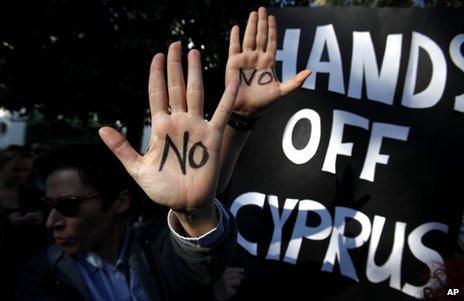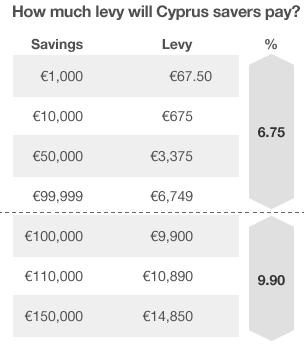Analysis: Arguments for Cyprus levy
- Published

The levy sparked angry protests in Cyprus
They promised that it would never happen, but the fifth bailout in the eurozone looks like it will be the first to hit savers directly, and not just at the wealthier end of the spectrum.
Since the financial crisis began in 2008 with the collapse of Lehman Brothers there has been a guarantee that all European deposits under 100,000 euros (£86,000; $131,00) were safe in the banks.
But the proposed levy on Cypriot depositors seems to break that promise - not the letter of the law perhaps, but certainly its spirit.
Officials point out that anyone paying the levy will be given banking shares in return. They are not losing out altogether.
But many small depositors in Cyprus will feel betrayed, and a seed of doubt may have been sown in the minds of investors in other countries.
Cypriot President Nicos Anastasiades has said he is continuing "to fight with the Eurogroup [of eurozone finance ministers] to amend their decisions, in order to limit the impact on small depositors."
But powerful voices within the Eurogroup insist that the Cypriots themselves were among those who wanted the pain spread as widely as possible.
'Not a German idea'
"The levy on deposits below 100,000 euros was not the creation of the German government," said German Finance Minister Wolfgang Schaeuble.
Earlier he specifically pointed the finger at the European Commission, the European Central Bank and the Cypriot government.

As more details emerge of how last Friday night's meeting on Cyprus progressed, it appears - rather astonishingly - that the structure of the deal was something of an accident.
The Germans and their allies were determined that the levy would raise 5.8bn euros to augment the bailout. They presumed that nearly all of it would be recouped from large unsecured depositors, many of them from Russia.
President Anastasiades was determined that no-one would have to forfeit more than 10% of their deposits. He wanted to protect Cyprus's reputation as an offshore haven.
To meet both these conditions, and to make the numbers add up, the demands made of those with deposits under 100,000 euros - those who had been assured that their money was safe - were more severe than anyone had expected.
All in all, it is a bit of a mess. Hence the need for renegotiation and delay, creating more of the uncertainty the Eurogroup was keen to avoid.
A revised proposal will shift more of the financial burden onto depositors with larger amounts of money in the system. But probably not all of it.
'Daylight robbery'
The danger is that once again many people will look at the politics of bailouts and austerity and conclude that they are designed to protect banks and big investors as much as possible.
The political fall-out of that perception is already manifest in electoral protests across southern Europe, and Cyprus could make things worse.
"This is little short of daylight robbery," said Guy Verhofstadt, the president of the Liberal group in the European Parliament.
"Whatever happened to the fine rhetoric and commitments to greater transparency and accountability in financial structures?
"Is the EU not losing enough support already through measures which do not have the support of its citizens?"
But some EU officials argue that the only alternative to a levy in Cyprus was the collapse of the banking system.
That, they suggest, would be far worse.
If the entire bailout for Cyprus were to be financed by loans from the eurozone and the IMF, its debts would become unsustainably high. So that is not going to happen.
The levy is a bit of a gamble, certainly in its original form. But if it can be restructured, to protect smaller depositors as much as possible, it may be the least bad option.